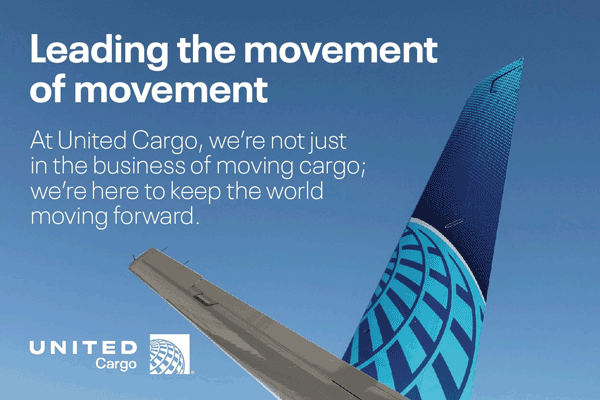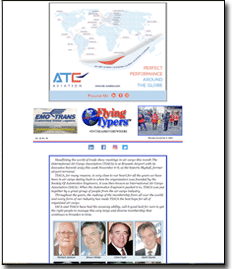
 |
 |
 #INTHEAIREVERYWHERE |
| Vol. 22 No. 41 | Tuesday
November 14,
2023 |
| |
 |
The
first thing you'll notice if you walk with Jan Krems is that he is probably
moving faster than you are.
FT: What
would you say as top United Cargo executive to the fellow air cargo community
as what everyone should be focusing upon to advance air cargo moving forward?
(What should everyone be focusing upon to advance air cargo moving forward)
FT: What
surprised you post COVID as pax capacity and pax travel came back? The
impact on cargo . . . rates adjustments, etc. |
 |
Kale Logistics Solutions (Kale) will be implementing an Airport Cargo Community System (ACS) for Istanbul Grand Airport (IGA), making it the first airport in Turkey to embark on digitalising cargo data exchange. The state-of-the-art cargo community platform, Airport Kargo Paydas¸ Platformu (KPP), developed by Kale, will be implemented at IGA in collaboration with TroyNet, the airport’s digital transformation partner. The ACS platform will assist IGA in becoming a regional cargo transfer centre for the world's leading cargo companies by facilitating end-to-end digitalisation, enhancing efficiency, streamlining procedures, and automating communication for stakeholders at its cargo precinct.  "Istanbul
is a critical air cargo connection point and we are determined to develop
and expand our air cargo network – the implementation of KPP is an
important milestone in providing best-in-class services to our customers
and stakeholders," said Selahattin Bilgen, (right) Deputy
Chief Executive Officer (CEO), IGA. "Istanbul
is a critical air cargo connection point and we are determined to develop
and expand our air cargo network – the implementation of KPP is an
important milestone in providing best-in-class services to our customers
and stakeholders," said Selahattin Bilgen, (right) Deputy
Chief Executive Officer (CEO), IGA.“We want to take our place in the sector as one of the world's most important global transfer centres and with this system, we will encourage digital trade, facilitate business, and establish a digital infrastructure to ensure that cargo moves faster at the least possible cost.” The ACS platform will offer IGA’s operators and its allied community, including agents, transporters, cargo handling companies, airlines, Customs, and security agencies, access to all cargo-related information on one common platform.  “For more than a decade, Kale has been combining its deep
industry knowledge and experience of working with more than 100 air cargo
stations to help airports transform into smart logistics hubs,” said
Vineet Malhotra, Director and Co-Founder of Kale Logistics Solutions.
“For more than a decade, Kale has been combining its deep
industry knowledge and experience of working with more than 100 air cargo
stations to help airports transform into smart logistics hubs,” said
Vineet Malhotra, Director and Co-Founder of Kale Logistics Solutions.“Our next-gen ACS is transforming IGA’s cargo operations with tech agility by supporting seamless customer experience, and optimising value chains for airports and nations at large.” The integration will contribute to the reduction of cargo lead times, speed up processing, reduce costs, and improve asset utilisation for all stakeholders. “We are very pleased with IGA’s decision to implement this project with our partner Kale, and we look forward to KPP making a positive contribution to all stakeholders by enabling air cargo and logistics sector growth,” said Dr. Emre Serpen, (left) Chief Executive, TroyNet. GDA |
Happy Diwali 2023 as The Adani Group, headed by the second-richest man in the world, Gautam Adani, could be seriously looking at starting a cargo airline. A whisper of the word although no official announcements yet from the Group regarding a cargo airline venture , but with all things Adani, it cannot be ignored! On October 23 this year, the Adani Group, announced in a regulatory filing with the Bombay Stock Exchange and the National Stock Exchange of India that the “Adani Ports and Special Economic Zone Limited (APSEZL) has incorporated a wholly owned subsidiary company Udanvat Leasing IFSC Ltd”. Udanvat has been incorporated to carry out business activity of owning and leasing of aircraft and it is registered to function from Gujarat International Finance Tec-City (GIFT City), in the state of Gujarat. GIFT City is a modern business center that offers liberalised corporate regulations and tax incentives. The move was not surprising. The group manages seven airports in the country – Mumbai, Ahmedabad, Jaipur, Thiruvananthapuram, Guwahati, Lucknow and Mangaluru – and, as a major player in the aviation sector, it was a logical move. Additionally, the group is involved in logistics too.  Headed by Gautam Adani’s son, Karan
Adani, APSEZ is being transformed to form an integrated logistics company
with an objective to add further value for the customers.
Headed by Gautam Adani’s son, Karan
Adani, APSEZ is being transformed to form an integrated logistics company
with an objective to add further value for the customers. APSEZ has expanded rapidly starting with two ports to a string of ten ports and terminals. Today, it is said that there is an Adani port at almost every 500 km of the Indian coastline. The seven airports promise to provide 2-3 million metric tons of cargo and 700 thousand take-offs and landings in addition to around 100 million passengers. Added to the seven, the Adani Group in a joint venture with the City and Industrial Development Corporation of Maharashtra (CIDCO) has been working on the Navi Mumbai International Airport (the Navi Mumbai Greenfield International airport has been conceived as an alternative to the present Mumbai International Airport or the Chhatrapati Shivaji Maharaj international airport, which has reached its saturation point). The airport is being constructed in four phases and the first two phases will be completed by December 2024, and “is preparing for Operational Readiness and Airport Transition by December 2024,” Gautam Adani mentioned in his address at the Adani Group AGM in July this year. By 2032, the airport will be able to handle 2.5 million tons (MT) of cargo and around 90 million passengers In short, the group, in the near future will be master of two major airports from the city which sees high tonnages and high-value cargo. In little over three years, the Adani Group, through the Adani Airports Holding Limited (AAHL), has become the largest airport operator in India. In a statement in July 2021 mentioned that, “AAHL is now India's largest airport infrastructure company, accounting for 25 percent airport footfalls. With the addition of MIAL (Mumbai International Airport Limited), it will now also control 33 percent of India's air cargo traffic”.  Readers
of FlyingTypers might remember the interview with Jeet
Adani, Gautam Adani’s other son, around June 2022, who spearheads
the Adani Airports business, about the group’s plans for cargo. Speaking
about Adani Airports Cargo’s plans to boost cargo tonnage, he said,
“All our airports present immense air cargo growth potential, both
domestic and international. In the short term, focus is on increasing interim
cargo infrastructure in the quickest way possible so that all airports provide
enough cargo capacity and infrastructure to improve service levels, provide
seamless IT connectivity and improve volumes. In the (not so) long term,
all our airports will be equipped with Integrated Cargo Terminals (ICT)
with all products and services under one roof (including Transshipment)
while the ICTs will be designed and developed to provide enough capacity
at least for the next 5 years, based on foreseeable volume demand. All the
ICTs will be modular and scalable, with some being highly automated. Roll
out of ICTs are expected to bring global service and infrastructure standards
to our airports.” Readers
of FlyingTypers might remember the interview with Jeet
Adani, Gautam Adani’s other son, around June 2022, who spearheads
the Adani Airports business, about the group’s plans for cargo. Speaking
about Adani Airports Cargo’s plans to boost cargo tonnage, he said,
“All our airports present immense air cargo growth potential, both
domestic and international. In the short term, focus is on increasing interim
cargo infrastructure in the quickest way possible so that all airports provide
enough cargo capacity and infrastructure to improve service levels, provide
seamless IT connectivity and improve volumes. In the (not so) long term,
all our airports will be equipped with Integrated Cargo Terminals (ICT)
with all products and services under one roof (including Transshipment)
while the ICTs will be designed and developed to provide enough capacity
at least for the next 5 years, based on foreseeable volume demand. All the
ICTs will be modular and scalable, with some being highly automated. Roll
out of ICTs are expected to bring global service and infrastructure standards
to our airports.”Perhaps, what is more important is that there are no Indian aircraft leasing companies and most carriers lease aircraft – 80 percent of India’s fleet is leased—from those based in Ireland. A major issue faced by lessors for the lease rentals is currency fluctuations. In fact, Air India was the first scheduled Indian airline to have acquired an Airbus A350—from an aircraft lease company registered in GIFT City. Udanvat Leasing IFSC Ltd has made no announcements regarding its business but aviation experts believe that an air cargo carrier could be coming soon from the group. According to air cargo stakeholders, the carrier, when it starts operations, would be focusing on e-commerce. The group has the infrastructure, the ports and airports -- with the foremost among them being Mumbai -- and it will mean taking just a logical step to complete the circle. It may be mentioned that in January 2021, the Gujarat government signed a Memorandum of Understanding (MoU) with APSEZ to set up the country’s biggest multi-modal logistics park at Virochan Nagar, near Sanand in Ahmedabad. The park, spread across 1,450 acres, will attract an investment of Rs 50,000 crore, while providing direct and indirect employment to 25,000 people. The park will have a dedicated air cargo complex and provide direct air, rail and road connectivity. The announcement also said, “The air cargo terminal will have a 4.6-km runway, which will be capable of handling large carrier vehicles like airplanes. It will also provide a global platform to the local export and import market. A rail freight terminal will also be established. This will be directly connected to the Delhi-Mumbai industrial corridor.” However, it might be mentioned that the moves for a cargo airline by the group could take some time given the adverse publicity it has been receiving after Hindenburg unearthed wrongdoings, which the Group has refuted. Also, it might be worthwhile to point out that India will see a general election in 2024 and if Prime Minister Narendra Modi’s Bharatiya Janata Party (the Prime Minister has been a staunch supporter of Gautam Adani) sees a decline in its fortunes, the Adani Group could find the going tough. Tirthankar Ghosh |
 |
If
You Missed Any Of The Previous 3 Issues Of FlyingTypers Access complete issue by clicking on issue icon or Access specific articles by clicking on article title |
||
 Vol. 22 No. 38 Where In The World? ATC Best GSSA Happyness Expo.be Knowing You |
 Vol.
22 No. 39 Vol.
22 No. 39Into The Glyn Chuckles for November 6, 2023 Tracking Trade Shows |
|
Publisher-Geoffrey Arend
• Managing Editor-Flossie Arend • Editor Emeritus-Richard
Malkin Film Editor-Ralph Arend • Special Assignments-Sabiha Arend, Emily Arend |
Send comments and news to geoffrey@aircargonews.com
|